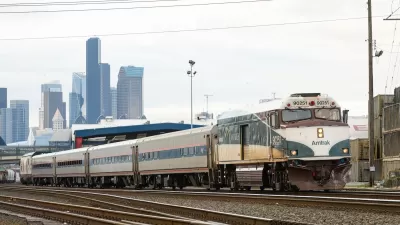A proposed oil-by-rail facility proposed for the Port of Vancouver could set a new standard for capacity.
A proposed oil-by-rail terminal at the Port of Vancouver would "handle an average of 360,000 barrels of crude per day, or up to four oil trains daily," reports Eric Florip.
"In fact, at full capacity, the proposal known as Vancouver Energy would handle more oil by rail than any single facility in the United States, according to an analysis of crude-by-rail terminals by The Columbian."
Vancouver Energy is a joint venture by Tesoro Corp. and Savage Companies, according to Florip. "The companies have said they don’t expect to move 360,000 barrels per day from day one. The Vancouver terminal will likely receive one to two trains daily at first, then build out to full capacity." The terminal could be fully operational within two years of launching construction.
The article also provides details on currently existing oil-by-rail facilities around the United States as well as plans to construct more such facilities—including a few others in Washington.
FULL STORY: Proposed oil terminal would be biggest in volume

Planetizen Federal Action Tracker
A weekly monitor of how Trump’s orders and actions are impacting planners and planning in America.

Congressman Proposes Bill to Rename DC Metro “Trump Train”
The Make Autorail Great Again Act would withhold federal funding to the system until the Washington Metropolitan Area Transit Authority (WMATA), rebrands as the Washington Metropolitan Authority for Greater Access (WMAGA).

The Simple Legislative Tool Transforming Vacant Downtowns
In California, Michigan and Georgia, an easy win is bringing dollars — and delight — back to city centers.

The States Losing Rural Delivery Rooms at an Alarming Pace
In some states, as few as 9% of rural hospitals still deliver babies. As a result, rising pre-term births, no adequate pre-term care and harrowing close calls are a growing reality.

The Small South Asian Republic Going all in on EVs
Thanks to one simple policy change less than five years ago, 65% of new cars in this Himalayan country are now electric.

DC Backpedals on Bike Lane Protection, Swaps Barriers for Paint
Citing aesthetic concerns, the city is removing the concrete barriers and flexposts that once separated Arizona Avenue cyclists from motor vehicles.
Urban Design for Planners 1: Software Tools
This six-course series explores essential urban design concepts using open source software and equips planners with the tools they need to participate fully in the urban design process.
Planning for Universal Design
Learn the tools for implementing Universal Design in planning regulations.
Smith Gee Studio
City of Charlotte
City of Camden Redevelopment Agency
City of Astoria
Transportation Research & Education Center (TREC) at Portland State University
US High Speed Rail Association
City of Camden Redevelopment Agency
Municipality of Princeton (NJ)



























